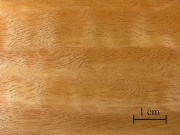Difference between revisions of "Eucalyptus"
(username removed) |
(username removed) |
||
| Line 4: | Line 4: | ||
== Description == | == Description == | ||
| − | Over 700 evergreen tree species belong to the genus ''Eucalyptus''. They are native to Australia but are now grown in many subtropical locations around the world (California, Spain, South America, India, South Africa, etc.). Eucalyptus wood is used for construction, papermaking pulp, inexpensive furniture and small turned items such as paintbrush handles. Most eucalyptus wood is durable but not dimensionally stable. The bark from the trees, however, is high in tannins and is used on a large scale for leather production. Most commonly used tannins are obtained from [http://cameo.mfa.org/materials/fullrecord.asp?name=maletto | + | Over 700 evergreen tree species belong to the genus ''Eucalyptus''. They are native to Australia but are now grown in many subtropical locations around the world (California, Spain, South America, India, South Africa, etc.). Eucalyptus wood is used for construction, papermaking pulp, inexpensive furniture and small turned items such as paintbrush handles. Most eucalyptus wood is durable but not dimensionally stable. The bark from the trees, however, is high in tannins and is used on a large scale for leather production. Most commonly used tannins are obtained from [http://cameo.mfa.org/materials/fullrecord.asp?name=maletto%20bark maletto bark] (''E. astringens'') and mugga or [http://cameo.mfa.org/materials/fullrecord.asp?name=red%20iron%20bark red iron bark] (''E. sideroxylon''). These tend to produce a dark red leather and are sometimes mixed with other tannins. [http://cameo.mfa.org/materials/fullrecord.asp?name=Eucalyptus%20oil Eucalyptus oil] is obtained from the dry leaves of several species of eucalyptus trees especially ''E. salicifolia'' and ''E. globulus'' (blue gum). |
[[File:34_Blue Gum_100x_Tan.jpg|thumb|Blue gum | [[File:34_Blue Gum_100x_Tan.jpg|thumb|Blue gum | ||
| Line 37: | Line 37: | ||
== Authority == | == Authority == | ||
| − | * | + | * G.S.Brady, ''Materials Handbook'', McGraw-Hill Book Co., New York, 1971 Comment: p. 382 |
| − | * | + | * Matt Roberts, Don Etherington, ''Bookbinding and the Conservation of Books: a Dictionary of Descriptive Terminology'', U.S. Government Printing Office, Washington DC, 1982 |
* ''The Dictionary of Paper'', American Paper Institute, New York, Fourth Edition, 1980 | * ''The Dictionary of Paper'', American Paper Institute, New York, Fourth Edition, 1980 | ||
| − | * | + | * E.J.LaBarre, ''Dictionary and Encyclopedia of Paper and Paper-making'', Swets & Zeitlinger, Amsterdam, 1969 |
| − | * ''Encyclopedia Britannica'', http://www.britannica.com Comment: "Eucalyptus." | + | * ''Encyclopedia Britannica'', http://www.britannica.com Comment: "Eucalyptus." Encyclopædia Britannica. 2005. Encyclopædia Britannica Premium Service 7 Apr. 2005 . |
| − | * | + | * H.L.Edlin, ''What Wood is That?'', Viking Press, New York, 1969 |
* Wikipedia, the free encyclopedia, at http://www.wikipedia.com Comment: http://en.wikipedia.org/wiki/Eucalyptus (Accessed Dec. 9, 2005) | * Wikipedia, the free encyclopedia, at http://www.wikipedia.com Comment: http://en.wikipedia.org/wiki/Eucalyptus (Accessed Dec. 9, 2005) | ||
| Line 53: | Line 53: | ||
* ''Van Nostrand's Scientific Encyclopedia'', Douglas M. Considine (ed.), Van Nostrand Reinhold, New York, 1976 | * ''Van Nostrand's Scientific Encyclopedia'', Douglas M. Considine (ed.), Van Nostrand Reinhold, New York, 1976 | ||
| − | * | + | * Random House, ''Webster's Encyclopedic Unabridged Dictionary of the English Language'', Grammercy Book, New York, 1997 |
[[Category:Materials database]] | [[Category:Materials database]] | ||
Revision as of 07:40, 24 July 2013
Description
Over 700 evergreen tree species belong to the genus Eucalyptus. They are native to Australia but are now grown in many subtropical locations around the world (California, Spain, South America, India, South Africa, etc.). Eucalyptus wood is used for construction, papermaking pulp, inexpensive furniture and small turned items such as paintbrush handles. Most eucalyptus wood is durable but not dimensionally stable. The bark from the trees, however, is high in tannins and is used on a large scale for leather production. Most commonly used tannins are obtained from maletto bark (E. astringens) and mugga or red iron bark (E. sideroxylon). These tend to produce a dark red leather and are sometimes mixed with other tannins. Eucalyptus oil is obtained from the dry leaves of several species of eucalyptus trees especially E. salicifolia and E. globulus (blue gum).
Synonyms and Related Terms
gumwood; white mountain ash; eucalyptus (Fr., Sven.); Eukalyptus (Deut.); eucalipto (It.); eucalipto (Esp., Port.); eucalyptusboom (Ned.); eukaliptus (Pol.); Tasmanian oak (Eucalyptus regnans); blue gum (Eucalyptus globulus); red iron bark (Eucalyptus sideroxylon); maletto bark (Eucalyptus astringens)
Other Properties
Color: light brown. Rings:distinct. Pores: distinct, coarse. Grain: distinct. Rays: obscure. Hard, heavy wood.
| Density | 42 ppcf |
|---|---|
| Molecular Weight | specific gravity = 0.67 |
Additional Images
Authority
- G.S.Brady, Materials Handbook, McGraw-Hill Book Co., New York, 1971 Comment: p. 382
- Matt Roberts, Don Etherington, Bookbinding and the Conservation of Books: a Dictionary of Descriptive Terminology, U.S. Government Printing Office, Washington DC, 1982
- The Dictionary of Paper, American Paper Institute, New York, Fourth Edition, 1980
- E.J.LaBarre, Dictionary and Encyclopedia of Paper and Paper-making, Swets & Zeitlinger, Amsterdam, 1969
- Encyclopedia Britannica, http://www.britannica.com Comment: "Eucalyptus." Encyclopædia Britannica. 2005. Encyclopædia Britannica Premium Service 7 Apr. 2005 .
- H.L.Edlin, What Wood is That?, Viking Press, New York, 1969
- Wikipedia, the free encyclopedia, at http://www.wikipedia.com Comment: http://en.wikipedia.org/wiki/Eucalyptus (Accessed Dec. 9, 2005)
- Van Nostrand's Scientific Encyclopedia, Douglas M. Considine (ed.), Van Nostrand Reinhold, New York, 1976
- Random House, Webster's Encyclopedic Unabridged Dictionary of the English Language, Grammercy Book, New York, 1997




